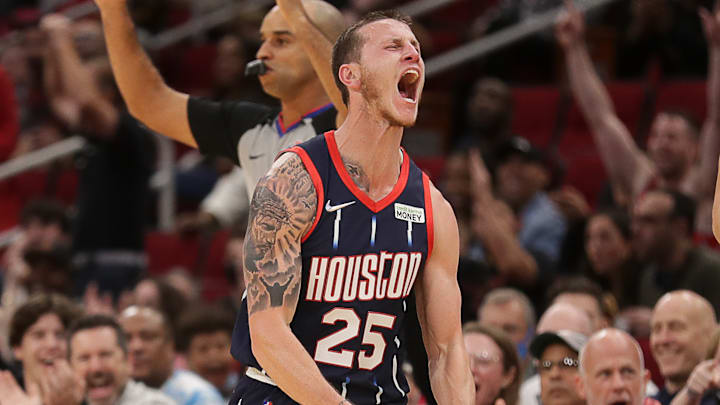The easiest way to describe the start of Garrison Mathews’ Houston Rockets career is that fans were compelled to call him “Garry Bird.” His injection into the Rockets' starting lineup saw a 1-16 team rattle off six consecutive victories in the season’s most unlikely seven-game win streak.
Over that seven-game run, Mathews averaged 16.1 points per game on 44.8% shooting from three. He wouldn’t be able to maintain that pace and finished the season averaging 10 points per game on 36% shooting from distance. However, the Rockets liked what they saw and quickly signed him to a four-year $8.2 million contract.
For teams in the early stages of a rebuild, finding players like Mathews is paramount. Productive players at a discount allow organizations to use cap space to acquire talent and/or assets. If the timelines don’t align, a player like Mathews can usually land something of value in a trade.
For Garrison Mathews, its as Easy as 3, 3, 3
The simplicity of Mathews' game is embolic of the modern NBA. He shoots a lot of threes, hits a fair amount of them, and forces defenses to account for him beyond the arc. With each passing season, teams are taking more and more threes, and the trend looks to have no end in sight.
While the basic arithmetic says three is more than two, the knock-on effect of a potent 3-point shooter goes far beyond the actual points. The points a dangerous 3-point shooter generates are almost secondary to the gravity their presence demands.
Garrison Mathews is putting on a shooting clinic today! ?pic.twitter.com/6TxkTHqudt
— Rockets Nation (@RocketsNationCP) December 11, 2021
Mathews is a 3-point shooter that not only possesses efficiency but also gravity. He can go 0-7 and still provide tremendous value to an offense through expanded driving and passing lanes. The 3-point revolution has many parallels to how the West Coast offense changed football. Passing to open up the run game, is the same idea as bombing from deep to create layups.
Mathews’ shooting impact is clear when you look at his on-off splits. When he was on the court, the Rockets had an offensive rating of 112.8, and when he sat it plummeted to 106.3. The Rockets also experienced a bump in 2-point efficiency, got shots closer to the rim, earned more free throws, dished more assists, and coughed up fewer turnovers.
Mathews wasn’t directly responsible for those gains, but at the same time, he played a crucial role without ever touching the ball. The Rockets weren’t a good offense with Mathews out there, but gaining +6.5 points per 100 possessions is still mighty impressive.
